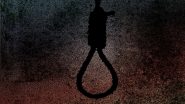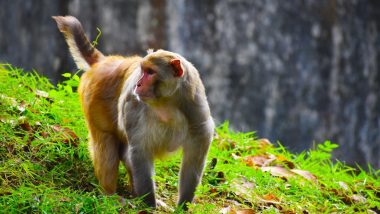Beijing, April 5: Hong Kong's Centre for Health Protection (CHP) is investigating a critical case of the rare "B Virus" infection in a 37-year-old man, marking the city's first documented human case. The individual tested positive for the virus after an encounter with wild monkeys at Kam Shan Country Park in late February, where he sustained wounds from the animals.
According to the CHP, the man, who otherwise had “good past health”, became severely ill and was admitted to Yan Chai Hospital’s emergency department on March 21 with a fever and “decreased consciousness level. On Wednesday this week, his cerebrospinal fluid specimen tested positive for the B virus at the Centre of Health Protection’s laboratory. The man infected is now in critical condition and is being treated in the intensive care unit of the hospital. Bird Flu Pandemic To Be Deadlier Than Coronavirus Outbreak? Experts Issue Warning, Say H5N1 Pandemic Could Be ‘100 Times Worse’ Than COVID-19.
What is B Virus?
The B virus, also known as the monkey B virus or herpes simiae virus, is primarily spread through macaque monkeys, which often carry the virus without showing symptoms. Transmission to humans can occur through bites, scratches, or contact with monkey tissues and fluids.
B Virus Symptoms:
Initial symptoms of the B virus infection resemble the flu, including fever, chills, muscle aches, and fatigue. However, the infection can rapidly progress, causing severe neurological damage and potentially fatal brain swelling. Band-Aid on Open Wounds Causes Cancer? Study Finds Cancer-Causing Forever Chemicals in Popular Bandage Brands Including Johnson & Johnson.
How Does it Spread?
Unlike the highly contagious COVID-19, the B virus is not easily transmitted. Only 50 cases have been reported in humans since its discovery in 1932, and just one known instance of human-to-human transmission has been reported. The transmission of a disease from an animal to a human is known as zoonotic spillover.
How Can B Virus Be Prevented?
Currently, no vaccines are available for B virus prevention. Health authorities advise against interacting with wild monkeys and recommend immediate medical attention for any wounds inflicted by these animals. Vets and lab workers are also urged to employ proper protective gear when handling macaque monkeys to mitigate the risk of infection.
Treatment:
Anti-viral medications can be used to treat the virus. Antiretroviral therapy (ART), or the treatment of human immunodeficiency virus (HIV) using anti-HIV drugs, can also be prescribed. Still, the CDC states that the decision on whether or not to prescribe ART takes into account several factors, including the condition of the macaque, how properly and quickly the wound was cleaned, and the nature of the wound, according to the Pennsylvania Department of Health website.
According to the CDC, B Virus infections initially present with flu-like symptoms, such as fever and chills, muscle aches, fatigue, and heartache. However, as the infection advances, it causes swelling of the brain and spinal cord, leading to brain damage, severe damage to the nervous system, and death.
(The above story first appeared on LatestLY on Apr 05, 2024 05:18 PM IST. For more news and updates on politics, world, sports, entertainment and lifestyle, log on to our website latestly.com).













 Quickly
Quickly




















